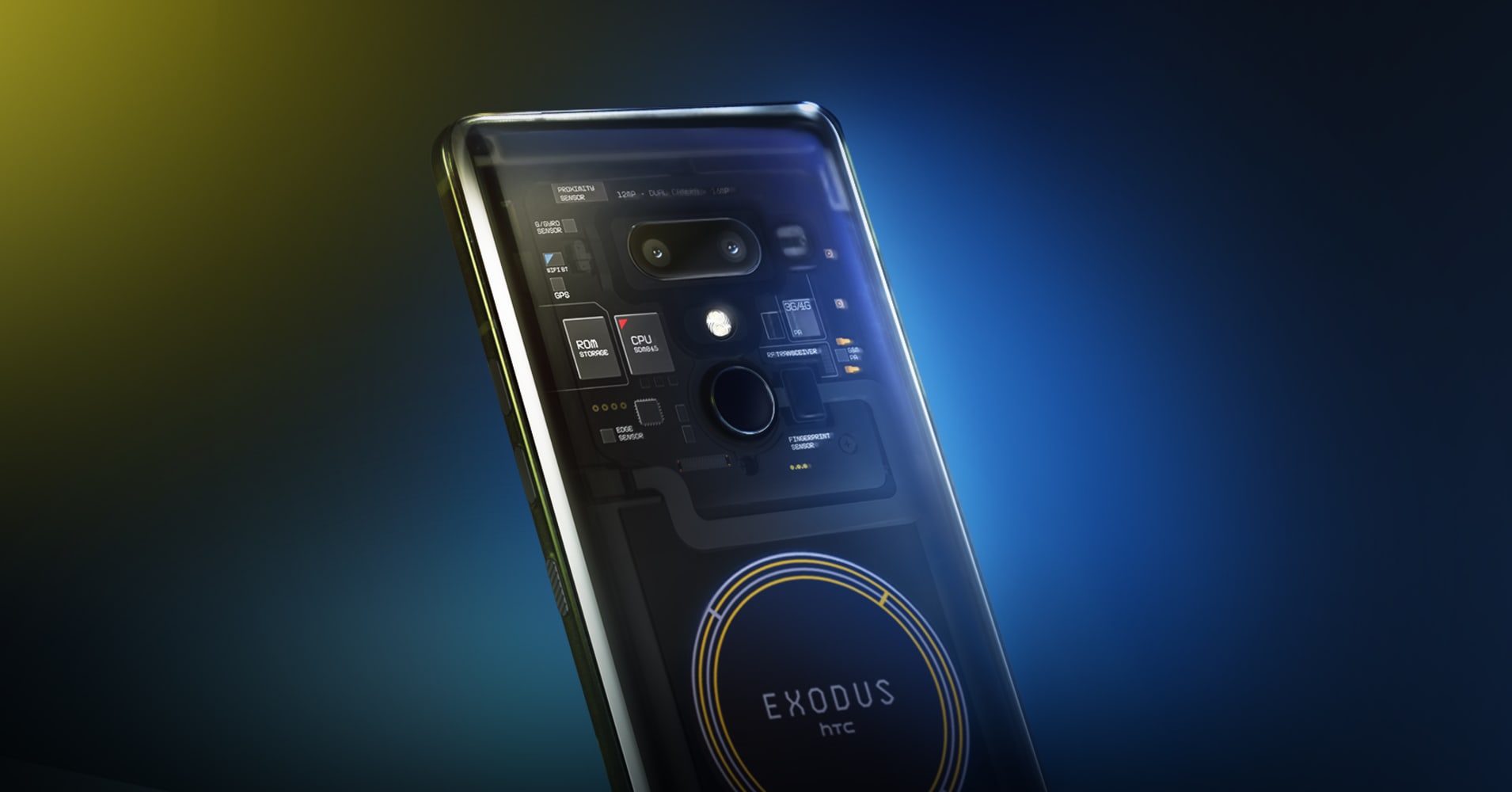
HTC unveiled its flagship blockchain-focused smartphone on Tuesday, the Exodus 1, as the struggling manufacturer looks to shift its strategy to focus on new technology.
The Taiwanese phone maker said it developed its own cryptocurrency wallet called Zion to make its new phone function as a hardware cryptocurrency wallet.
The Exodus 1 comes with a secure enclave — a secluded area on the phone's chip kept separate from the Android operating system (OS) it runs on — that uses technology made by SoftBank's Arm Holdings to keep a customer's cryptocurrency safe.
"Think of it as a micro OS that runs in parallel with Android," Phil Chen, HTC's decentralized chief officer, told CNBC over the phone. "It basically is a wallet, but the wallet, what it does is hold your private keys." Private keys are lines of code which are meant to be known only to the owner of a cryptocurrency to allow them access to their funds.
Chen said the benefit of keeping this area of the phone separate from Android was that Google's OS is "fundamentally insecure with a centralized system," and therefore storing cryptocurrency using Android would make a user's funds more vulnerable to a hack.
He said the significance of integrating blockchain technology in the phone is that it bolsters the security and privacy of a user's assets, and will in the future help with protecting a customer's data and identity. Blockchain can be thought of as a tamper-proof digital ledger that records cryptocurrency transactions and other data across a distributed network with no central authority overseeing it.
"The dominant companies in our world today are Google and Facebook, and in China, Baidu, Alibaba and Tencent, because they basically own all our data," Chen said.
"And the reason why you do a blockchain phone is ... for everybody just to own their own keys. Everything starts there. When you start owning your own keys, then you can start owning your own digital identity, then you can start to own data."
HTC's new phone will run decentralized applications, digital programs that operate on the blockchain. It also comes with a "Social Key Recovery" function that lets a user regain access to their funds if they lose their private key via a select number of trusted contacts.
Other than its blockchain features, the Exodus 1 also includes:
- A 16 megapixel dual main camera and an 8MP dual front camera with 4K video.
- A six inch display with quad-HD+ resolution.
- A Qualcomm Snapdragon 845 processor.
- Six gigabytes of RAM and 128GB of storage.
HTC's early access Exodus 1 is available for pre-order at a price of 0.15 bitcoins or 4.78 ether tokens, which translates to about $960, and is expected to be shipped by December. That huge price tag places it on similar footing with premium smartphones in the market like Apple's iPhone XS and Samsung's Galaxy Note 9.
But it's important to take note of the cryptocurrency market's notoriety for volatility; bitcoin's price, for example, has been known to climb or fall hundreds of dollars in value within hours.
"It's definitely important that there's this excitement and this huge crypto bubble and people are paying attention and buying bitcoin and ether," HTC's Chen told CNBC. "But is this the most important thing? Is this the reason why we're doing this blockchain phone? No."
Chen rebutted concerns that the exclusivity of the phone's availability to cryptocurrency holders would shut out some of HTC's core audience.
"Selling it in crypto only and being the first to do so means we are bringing this directly to the core audience and those who will want this device — the blockchain community," he said. Chen pointed out that HTC is inviting third party cryptographers and developers to give it feedback on phone.
HTC — once a powerhouse in the cellphone industry — has seen its status dwindle in recent years, with competitors like Apple and Samsung winning over market share, and Chinese rivals like Huawei and Xiaomi climbing in the ranks of the world's largest phone vendors. The 2008 HTC Dream was the first commercially released smartphone to run on Android.
With a decline in its own phone sales, and a broader slowdown for the industry, HTC has diversified its business, branching out into virtual reality for instance with the HTC Vive, in partnership with gaming firm Steam.
The biggest sign that the company was trimming back its phone business came earlier this year when it struck a $1.1 billion deal with Google to move 2,000 of its employees to the U.S. tech giant — most of whom had worked on Google's flagship Pixel phones — and to give it a non-exclusive license for HTC's intellectual property.
It has also recently cut a significant chunk of its global workforce, with its total headcount decreasing to 5,822 from the 7,322 employees it had in March.
HTC's Chen told CNBC the focus on blockchain was part of the firm's shifting strategy regarding smartphones, which he said will prioritize software and intellectual property.
"We believe blockchain is the new paradigm for smartphones and it will form part of HTC's wider smartphone strategy," Chen told CNBC. "This marks a change in HTC, with increased focus on software and IP."
HTC is not alone in developing a blockchain phone though. Start-up Sirin Labs has plans of its own for a $1,000 blockchain-based phone called Finney, which it expects to release before November.
Bagikan Berita Ini















0 Response to "HTC launches its blockchain-focused phone, but you can only buy it in cryptocurrency"
Post a Comment